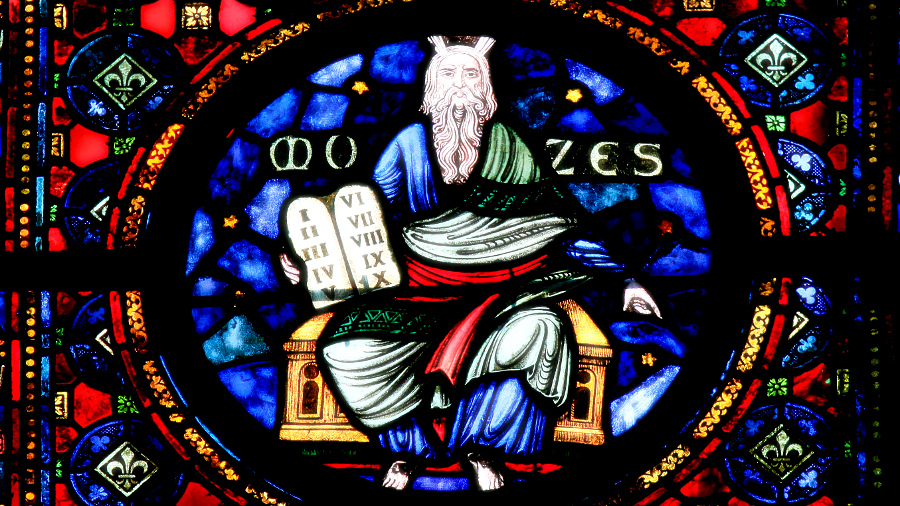Moses made his way up the mountain and into the very presence of God's glory. God gave Moses his 10 Commandments with these words of introduction:
And God spoke all these words: “I am the Lord your God, who brought you out of Egypt, out of the land of slavery. You shall...” (Exodus 20:1-3).
God wanted his people to know that the laws grew out of his relationship with them as their faithful deliverer. God alone had earned the right to speak truth into their lives, compassion into their hearts, and righteousness into their behaviors. James Nored talks about the 10 Commandments in today’s video:
|
|
|
If you can't see the video, and you sure don't want to miss it, view it online. For additional ideas to consider and some things to discuss with others, we encourage you to see the Study Guide. |
These commands were not Moses' ideas, but God's. God wrote the 10 Commandments with his finger on tablets of stone (Deuteronomy 6:10). The ten commands teach us about how we are to honor God as God — commands 1-4. The rest tell us how we are to treat each other as people created in the image of God — commands 5-10. These commands allowed Israel's great teachers to communicate the will of God through two great divine principles. Jesus made clear to his disciples and his critics that we should structure our lives and build our character around those two principles:
Hearing that Jesus had silenced the Sadducees, the Pharisees got together. One of them, an expert in the law, tested him with this question: “Teacher, which is the greatest commandment in the Law?”Jesus replied:
"Love the Lord your God with all your heart and with all your soul and with all your mind." This is the first and greatest commandment. And the second is like it: "Love your neighbor as yourself." All the Law and the Prophets hang on these two commandments” (Matthew 22:34-40).These two divine principles — built upon the 10 Commandments they summarize — form the foundation and definition of morality and ethics for the person of God. As followers of Jesus, however, we are called both to a higher standard and new freedom in Jesus. Rather than laws we obey, we are called to follow Jesus who we are to emulate. Jesus is God's clear and complete message of truth (Hebrews 3:1-3). Jesus reveals to us God himself because he was God with us in human flesh during his time on earth (John 1:1-18; Matthew 1:23).
What the Law could not do is empower us, as God's people, to obey. Left to our own willpower and best intentions, we often fail. So, God sent Jesus to liberate us from law-keeping and sent the Holy Spirit to empower us to live the kind of life that the 10 Commandments called us to live. Paul put it this way:
So, my brothers and sisters, you also died to the law through the body of Christ [Romans 6:3-14], that you might belong to another, to him who was raised from the dead, in order that we might bear fruit for God. For when we were in the realm of the flesh, the sinful passions aroused by the law were at work in us, so that we bore fruit for death. But now, by dying to what once bound us, we have been released from the law so that we serve in the new way of the Spirit, and not in the old way of the written code (Romans 7:4-6; cf. 2 Corinthians 3:1-16).What the Law could not do to make us righteous, Jesus did for us on the cross. What the Law could not do to change our behaviors, the Holy Spirit does by empowering us to conform our lives and actions to Christ — a standard much higher than any law:
Now the Lord is the Spirit, and where the Spirit of the Lord is, there is freedom. And we all, who with unveiled faces contemplate [and reflect] the Lord’s glory, are being transformed into his image with ever-increasing glory, which comes from the Lord, who is the Spirit (2 Corinthians 3:17-18).This calling to be like Jesus is a higher calling than the 10 Commandments could accomplish. The goal, however, is the same: we are to reflect the faithfulness, gracious compassion, and righteous character of the LORD God! Our lives are to be shaped by God and his nature, not by our fleeting desires or the world's standards for morality. The apostle Paul articulated this understanding better than anyone. He made helping others become like Christ his life's mission:
God has chosen to make known... the glorious riches of this mystery, which is Christ in you, the hope of glory.He is the one we proclaim, admonishing and teaching everyone with all wisdom, so that we may present everyone fully mature in Christ. To this end I strenuously contend with all the energy Christ so powerfully works in me (Colossians 1:27-29).
While Paul wanted new followers of Jesus to have the faithfulness, gracious compassion, and righteous character the Law called them to have, he pointed them to Jesus as the way to find this goal. This passion led the apostle to make this bold claim:
My dear children, for whom I am again in the pains of childbirth until Christ is formed in you... (Galatians 4:19).So, what does that mean for you and me?
We are to align our obedience to these commands and principles through the life, teaching, and sacrifice of Jesus.First, we see the 10 Commandments as the foundation for our ethics and morality. Jesus did and expounded on their implications throughout his ministry.Second, we view the two great commands that Jesus emphasized as the divine principles as the compass points by which we can evaluate our lives and our decisions. Am I doing what I am doing because of my love for God or to be acceptable to my culture? Does God have my allegiance in every area of my life — my heart, my soul, my mind, and my physical strength? Does the way I live reflect my love for others around me, my neighbor? In my daily living, do I love my neighbors the way God has loved me in Jesus?
Third, we seek Jesus. He is the living embodiment of what the 10 Commandments and the two divine principles teach. He is the window through which these commands and principles come into clear focus. We are to align our obedience to these commands and principles through the life, teaching, and sacrifice of Jesus.
Fourth, as we pursue Jesus, we yearn for the Holy Spirit to be at work in us to conform us — heart, soul, mind, and strength — to Jesus. We recognize that will power alone cannot lead us to the life God longs to see in us. When we succeed at law-keeping, we can swell with pride. When we fail, we can easily succumb to shame or hardness of heart. Only the Spirit can transform us to have the faithfulness, gracious compassion, and righteous character of Jesus (Galatians 5:22-23).
The LORD God personally wrote the 10 Commandments on tablets of stone. His actions were a precious act of love and grace. However, as followers of Jesus, we look to an even more precious hill, Golgotha. On this hill, Jesus wrote God's faithfulness and gracious compassion in his own body. His death provides us the righteousness we need now to live for him!
We see God's faithfulness, righteousness, and compassion throughout the Bible. However, we see these qualities of God demonstrated most clearly in Jesus. He showed us what God looks like in human flesh. He also demonstrated what God wants us to become as disciples (John 1:14-18). Our story doesn't end at Mount Sinai. Moses' trip up that mountain was glorious. The Law Moses brought to God's people was incredible. However, Jesus is our new standard. The Holy Spirit is our transformative power to become what God wants of us. With God's help and each other's encouragement, we will continue asking the Spirit to write God's character on our hearts and in our lives until our story ends with Jesus, in glory (Colossians 3:1-4).
Special thanks for the use of the Jesus images in our section, "Finding My Story in God's Story," to Free Bible Images and The Lumo Project.
© Story of Redemption Films and Heartlight.org
"God's Character Shapes His People" by James Nored & Phil Ware is licensed under a Creative Commons License. Heartlight encourages you to share this material with others in church bulletins, personal emails, and other non-commercial uses. Please see our Usage Guidelines for more information.














Reader Comments
Archived Facebook Comments